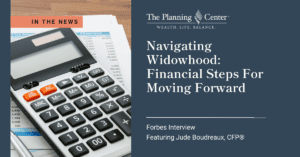by Michael A. Branham, CFP®
Life is full of surprises and transitions.
Weddings, the birth of a child, a new job/promotion, or a financial windfall would all fall in the “positive” surprise category with respect to your long-term financial planning. There are, however, surprises that are less favorable, and can create anxiety for those that experience them. One of the more prevalent transitions that fall within the “negative” surprise category is the anticipation, or realization, of a job loss or downsizing.
 A job loss can be an immediate surprise, but often it comes with some warning. In some cases, a job loss comes with severance income. Other times, you may be forced to adapt and react without any assistance. Long-term planning that prepares for the potential of a job loss is always the best course of action. Unfortunately, that’s not always part of the plan. If you do find yourself anticipating or experiencing a job loss, here are a few key things you can do to effectively deal with the transition.
A job loss can be an immediate surprise, but often it comes with some warning. In some cases, a job loss comes with severance income. Other times, you may be forced to adapt and react without any assistance. Long-term planning that prepares for the potential of a job loss is always the best course of action. Unfortunately, that’s not always part of the plan. If you do find yourself anticipating or experiencing a job loss, here are a few key things you can do to effectively deal with the transition.
Update your financial plan.
Whether you work with a financial planner or handle your planning personally, now’s the time to re-engage with your long-term financial plan. There’s no time like the present to review and prioritize your monthly expenses and to assess the available reserves and income sources you might rely on while you’re out of work. Some of the questions we’d ask include:
- What are the cash levels set aside to provide needed income in case of a job loss?
- Are your long-term investment accounts a viable source of funds?
- Are you eligible for, and prepared for, an early retirement if needed?
- How soon, if at all, will you need to return to work, and what level of income must a new job provide given other available resources?
- Will future work fall in line with work you’ve done in the past, or is now the time to pursue a career?
- Does a potential job loss change your social security claiming strategies and timing?
- What is the tax impact of your potentially reduced income, and are there strategies you can take advantage of during your employment loss?
- Is claiming unemployment a viable strategy?
While this is not an exhaustive list, it does provide some guidance and focus that may be useful as you work through the long-term planning.
Review your options with respect to critical benefits
One of the biggest anxiety-inducing aspects of a lost job is the impact it may have on you or your family, with respect to the benefits you received while employed. The biggest example of this, particularly for families, is the continuation of health insurance benefits. While COBRA benefits may be an option, they typically come with dramatically increased premium costs and are a shorter-term solution with an 18-month window. It is worth reviewing the comparative costs of COBRA coverage with those of private insurance or state-based medical insurance programs, especially if your time away from work could be substantial.
Other potential benefits worth reviewing include provided or supplemental life insurance (particularly in cases where insurability is in question), group disability insurance, and pension and retirement plan benefits. Working with your financial planner can help answer the questions about how critical the loss or discontinuation of these benefits may be, and how you might supplement or replace lost benefits.
Re-engage with your social and professional networks
As we get comfortable in our jobs, we often let the professional and personal relationships we’ve maintained in the past stagnate. Even in a LinkedIn society, it takes time and effort to maintain your networks, many of which can grow stale while one focuses on work, family, and the other aspects of one’s life. If that’s true for you, now’s the time to re-engage.  Have lunch with former colleagues and friends with whom you’ve meant to connect for some time. Reach out through personal connections or social media to key centers of influence, particularly in the field(s) in which you may wish to work. Update your resume or CV with recent employment history and accomplishments to highlight your personal and professional achievements. Share your story with those who matter and can be of help as you plan to begin the next phase of your professional life.
Have lunch with former colleagues and friends with whom you’ve meant to connect for some time. Reach out through personal connections or social media to key centers of influence, particularly in the field(s) in which you may wish to work. Update your resume or CV with recent employment history and accomplishments to highlight your personal and professional achievements. Share your story with those who matter and can be of help as you plan to begin the next phase of your professional life.
Take a breath and don’t make irrevocable decisions
There’s no doubt a potential job loss will create some anxiety, and there will be many questions to answer and a multitude of available solutions. The best advice I can give to those navigating these choppy waters is not to make any irrevocable decisions without consulting a planner and tax advisor. We have already outlined some of these decision points, particularly with respect to your long-term plan and benefits. For example, deciding to cash out your 401k (or not) without examining the alternatives and impact is something we see often before an individual chooses to seek professional advice. Pension decisions, severance decisions, and benefits decisions fall into this category as well. Remain flexible, understand the implications of each decision, and don’t create future problems based on fear and uncertainty!
Ideally, you are working with a comprehensive, objective financial planner in executing a long-term plan, and the prospects of a job loss have already been considered as part of that plan. If not, fight the urge to let anxiety drive the decision-making process. Consider your options with respect to your long-term financial and life plan!
 Mike Branham, CFP®, is a Sr. Financial Planner in the Anchorage and Twin Cities offices of The Planning Center, a fee-only financial planning and wealth management firm. Email him at: mike@theplanningcenter.com.
Mike Branham, CFP®, is a Sr. Financial Planner in the Anchorage and Twin Cities offices of The Planning Center, a fee-only financial planning and wealth management firm. Email him at: mike@theplanningcenter.com.






